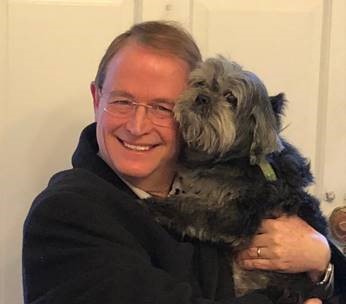
The crowd was spectacular: fathers donning pink hats with ears, women holding bright signs inscribed with colorful language, and little girls wearing t-shirts that said things like “Future President” and “My daddy is a feminist.” Last Saturday’s Women’s March on New York City drew over 200,000. Women, men, children and even some dogs started gathering at Columbus Circle and lined up all along Central Park West, reaching as far north as 72nd Street.
Going to the March was a last minute decision after receiving an invitation to go with a friend. I hadn’t gone to any of the marches last year, mostly because I am claustrophobic and can’t stand being trapped in a sea of people (the 8 am A Train is my living hell). This year I thought I would brave the crowds and see what this marching is all about.
After getting out of the oh-so-congested subway at Columbus Circle, we were greeted by law enforcement instructing us to walk up Broadway. We walked past the Trump International Hotel and Tower. We walked past Lincoln Center, home of The Metropolitan Opera. We walked past a number of male street vendors selling buttons that said things like “Stay Strong, Stay Nasty” and “Girls just wanna have Fun-damental human rights.” Just when it started to feel like we were journeying on a sexual assault trail of tears, we finally arrived at ABC studios, where we could cross over 66th Street toward the park.
“Is this the march?” I heard one woman ask as we turned the corner.
“No,” said her friend. “We are marching to the march.”
Right before we got to the end of the intersection of 66th and Central Park West, the crowd had come to a stand still. Police kept us from joining the rest of protestors. Stuck and frustrated on 66th, we followed the lead of an elderly woman holding a poster that read “My arms are tired from holding this sign since the 1960s” and busted through a side barricade when the police officer was looking the other way.
We were finally on Central Park West and headed north to find an opening that would allow us to cross the park side of the street. Once we crossed, I felt like I was able to breathe again as there was a bit of elbow room. Now that we were done marching to the march, it was time to stand in line for the march. It was tough for me to find the perfect standing and waiting spot. I needed a place where I could feel a part of the crowd, while still maintaining my personal bubble.
We walked down the sidewalk through the crowd and finally stopped by a stone wall that bordered the park. The journey from the subway exit to this resting place had taken us a little less than two hours. We finally claimed a spot and waited for the crowd to start marching.
As we waited, we took it all in. Looking at all the signs, the t-shirts, the various costumes of lady liberty and female genitalia, I was surprised by how many causes were represented: immigration rights, racial justice, LGBTQ+ rights, women’s empowerment groups, disability rights, women’s reproductive rights, women’s and children’s healthcare, peace and reconciliation, environmental protection, science education, anti-human trafficking, domestic violence prevention, sexual harassment and abuse prevention, and children’s rights. There were so many voices shouting in the chorus, “We will not be silent, and we are not going away.”
The intersectionality of the Women’s March was undeniable. People of all races, genders, ages, sexual orientations, religions, education levels and apartment sizes came together as one group to say, “This Matters.” Yet, in the clamor of it all, I felt lost.
I had journeyed for two hours to this place, only to feel empty. I felt like an outsider, a spectator. It didn’t make sense. I care about these causes. I, too, am angry with the current administration’s negligence towards human rights. I whole-hearted believe in the impact of organizing for social and political change. I am glad we live in a country that gives us the freedom to peacefully protest and speak our minds. But I wanted more. I wanted something that a march just couldn’t provide.
Last Sunday a group of parents got together at Plymouth Church to learn how to talk to our children about racism. This Sunday a group of Plymouth people will watch a documentary and learn how to end human trafficking in Brooklyn. The first Sunday of February, volunteers will pack food bags to give to hungry families through Brooklyn Delivers. When I think of these and the other Plymouth ministries, I realize that social and political activism doesn’t just happen in the streets. It happens in the pews, in the prayer circles, in the baptismal font, in the pulpit, in the offering plate, in Hillis hall, and in the Sunday School classroom.
Church isn’t just a house of worship. Church is an auditorium for the voiceless, an assembly of protest, an incubator for activism, a forum for forgiveness and a place of peace. The Church is continuously marching. There are no barricades to keep people out. There is no waiting around for things to get started. The march is here and now and always.



